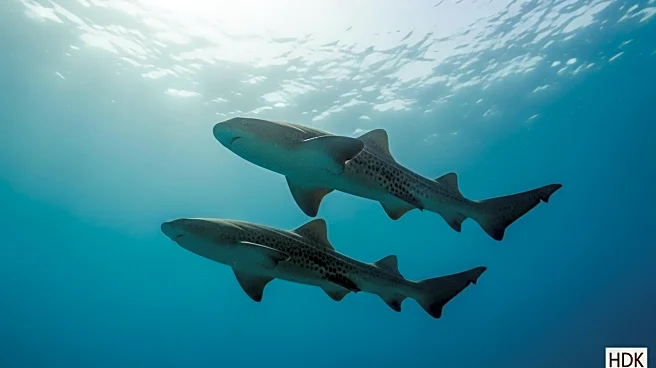What is the story about?
What's Happening?
Marine biologists have captured a rare video of leopard sharks engaging in group copulation in the wild, marking a significant advancement in understanding the reproductive behaviors of this endangered species. The study, published in Springer Nature's Journal of Ethology, was conducted by Hugo Lassauce and his team from the University of the Sunshine Coast. The video, filmed at Abore Reef, New Caledonia, shows two male leopard sharks mating sequentially with a female, providing unprecedented insights into their natural mating strategies. This discovery is crucial as leopard sharks, also known as zebra sharks, are listed as endangered by the IUCN, and have primarily been studied in captivity. The findings emphasize the importance of identifying and protecting key mating habitats to aid in effective species management.
Why It's Important?
The documentation of leopard sharks' natural mating behaviors is a breakthrough for marine conservation efforts, particularly for endangered species. Understanding these behaviors can inform strategies to protect and manage leopard shark populations, which are threatened by habitat loss and human activities. The study's insights could also support artificial insemination research aimed at rewilding leopard sharks, potentially increasing their numbers in the wild. This research highlights the broader significance of preserving marine biodiversity and the ecosystems that support it, which are vital for maintaining ecological balance and supporting human livelihoods dependent on healthy oceans.
What's Next?
The findings from this study may lead to enhanced conservation strategies, including the identification and protection of critical mating habitats for leopard sharks. Researchers may also explore artificial insemination techniques to bolster wild populations. Conservationists and policymakers could use this information to implement measures that mitigate human impact on these habitats, ensuring the survival of leopard sharks. Further studies may be conducted to observe similar behaviors in other shark species, expanding the understanding of marine reproductive strategies and their implications for conservation.
Beyond the Headlines
The study raises ethical considerations regarding human intervention in natural reproductive processes, such as artificial insemination. It also underscores the cultural importance of preserving endangered species, which are integral to marine ecosystems and have intrinsic value. Long-term shifts in conservation practices may emerge, focusing on habitat protection and sustainable human interaction with marine environments.
















